Sep 23, 2025 – Arrival in Korea, Visit to Dubuk Retreat Center Farm
Hello. The hot summer has passed, and we’ve entered early autumn with cool mornings and evenings. Today marks the return to Korea after completing the Southeast Asia survey trip.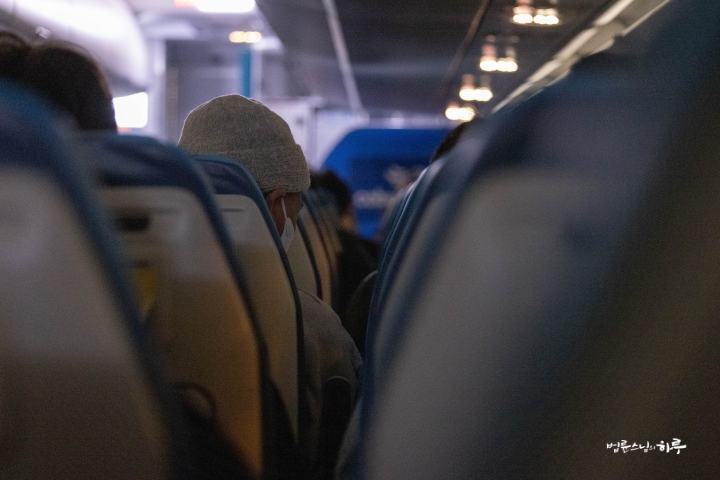
Sunim departed from Bangkok Airport at 1:20 AM and arrived at Incheon Airport at 8:45 AM Korean time. He got off the plane after spending the night on board, dozing off in his seat.
After leaving Incheon Airport, Sunim headed straight to Dubuk Retreat Center. Due to heavy traffic, the journey took 6 hours by car, arriving at 3:45 PM.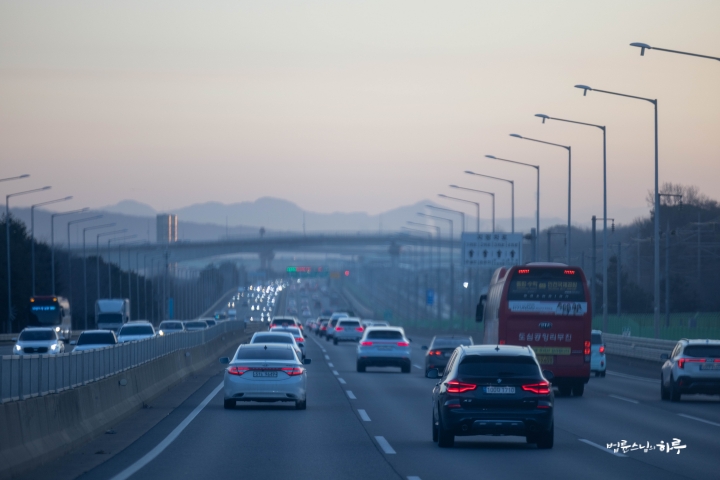
After a late lunch, Sunim toured the Dubuk Retreat Center farm in the afternoon. He first checked how much the cabbage, radish, and lettuce planted in the garden five days ago had grown.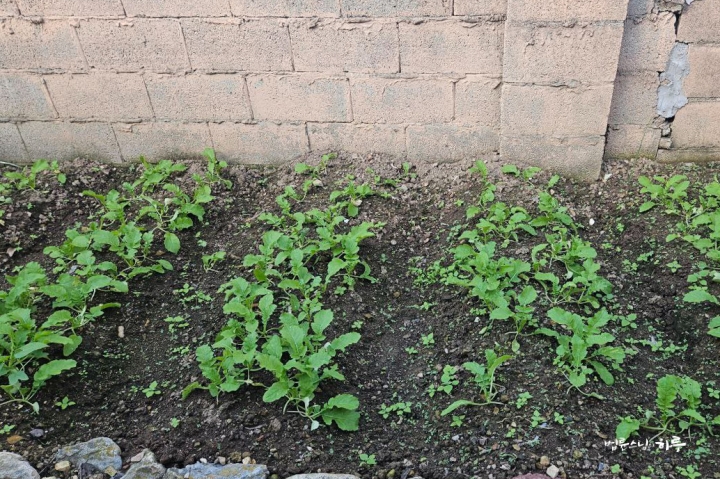
He first inspected the radish field. The radishes had settled in, sprouting evenly green leaves. Though the leaves weren’t large yet, their orderly rows showed vigor, and their energy was evident as they grew confidently among the weeds. Underground, they were preparing to gradually develop their roots.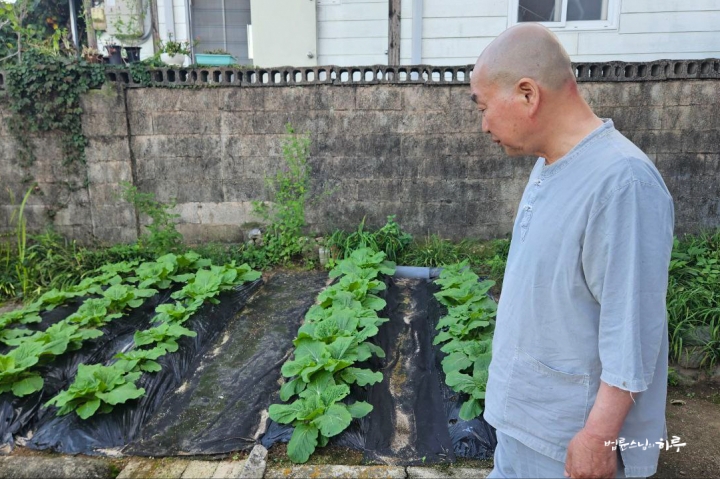
Next, he walked to the cabbage field. The cabbages planted on vinyl mulch had grown much larger than the radishes. Their broad leaves spread in all directions, growing lushly, while the centers gathered in circles, showing signs of heading. The cabbages lined up at regular intervals looked abundant and robust at a glance.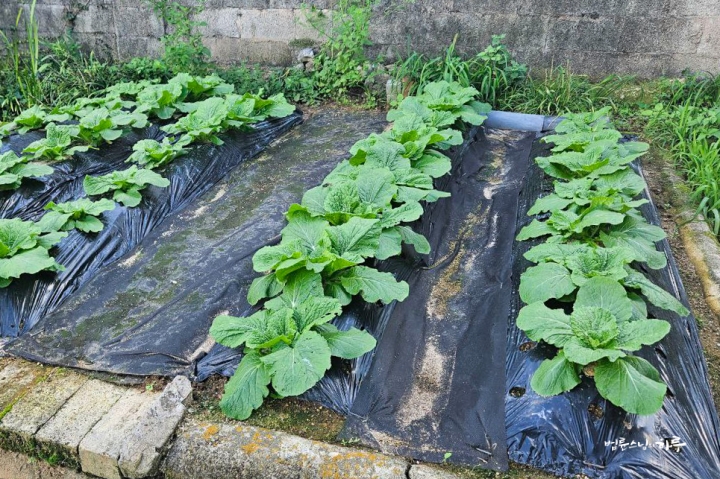
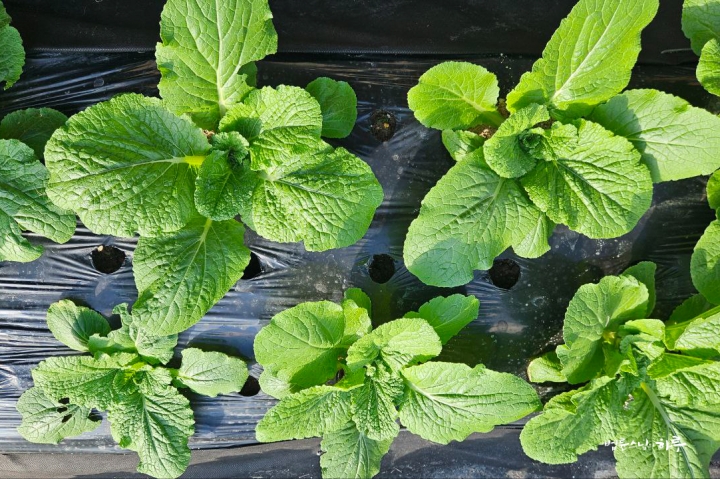
After changing into work clothes, Sunim went to the greenhouse to inspect the crops.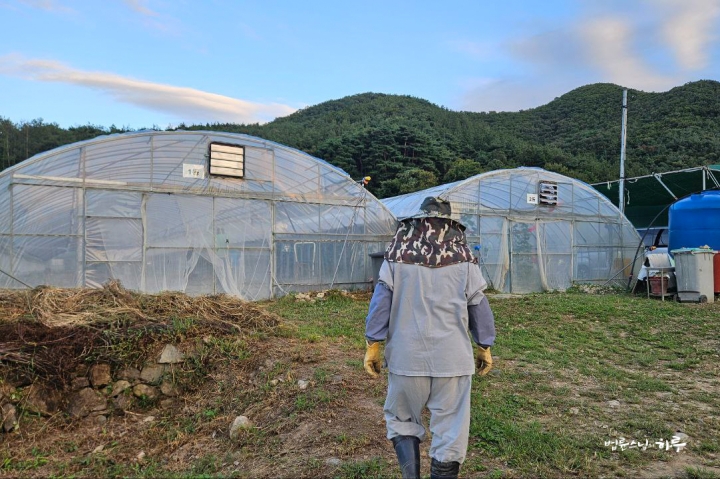
The cucumbers growing on vines stretched straight along the strings, with yellow flowers blooming among the green leaves. The flowers shone brightly in the sunlight, showing promise of bearing fruit. Sunim observed the growth of the cucumber flowers and leaves for a moment. Inside the greenhouse, green leaves and yellow flowers harmonized together.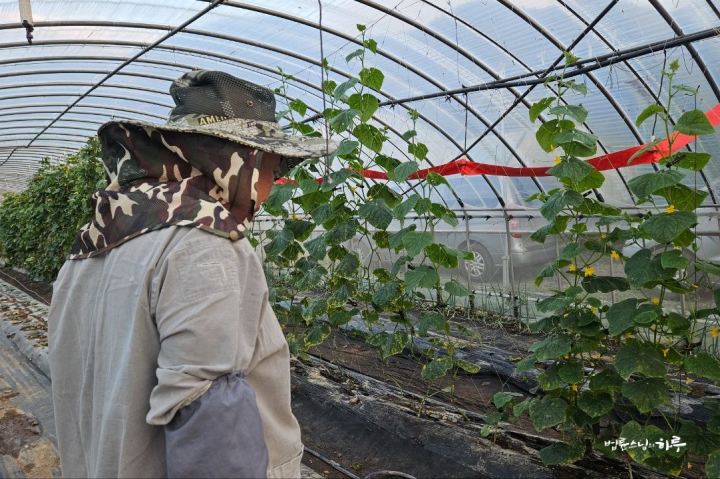
Next, he walked along the rice paddy ridges, examining the color of the rice and the condition of the fields. Among the green leaves, the yellowing rice was bowing its heads.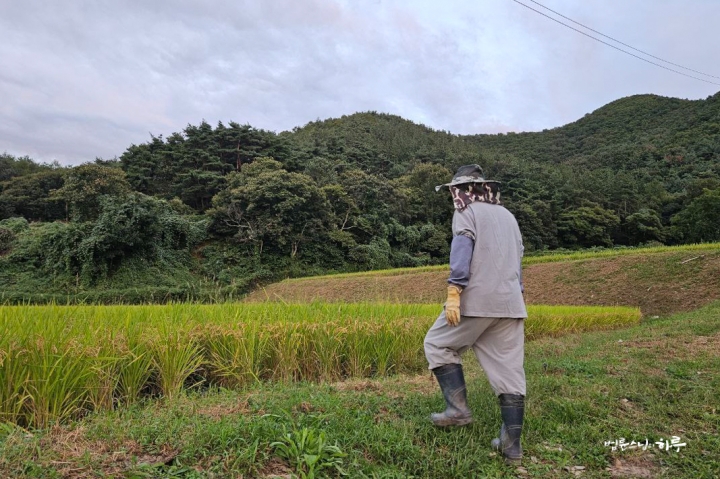
Sunim entered the middle of the rice field and examined the grain heads in his hands. The rice grains were gradually ripening, indicating that the autumn harvest was approaching.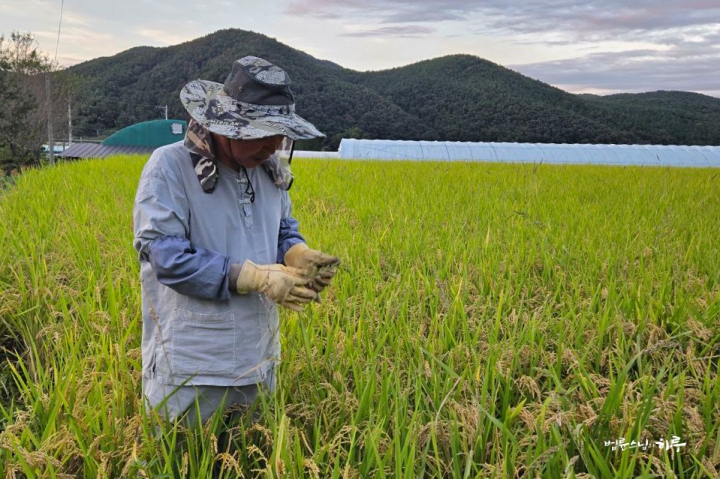
Many barnyard grass plants had grown between the rice plants. After pulling out the weeds, he left the field.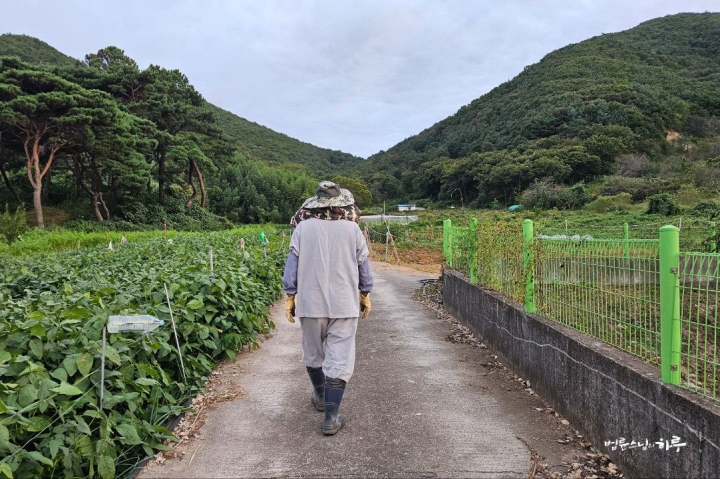
Around Dubuk Retreat Center, there are many chestnut trees that have been cultivated since old times. Among them, there’s a tree that drops chestnuts a bit early. Wondering if any chestnuts had fallen, he went to check. Sure enough, many chestnuts had fallen.
“I should gather some chestnuts. If we boil chestnuts for tomorrow’s interfaith gathering, the elders will enjoy them.” 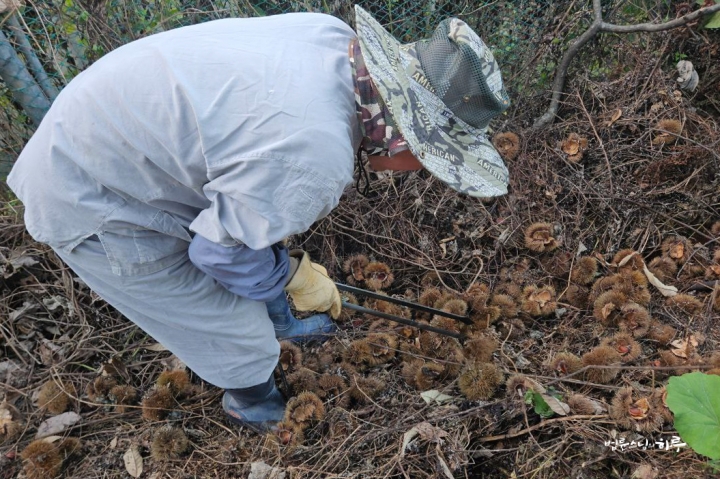
Sunim gathered the fallen chestnuts under the tree. Wearing gloves and using tongs, he examined each fallen chestnut bur on the ground and extracted the chestnuts. Inside the burs were firmly ripened brown chestnuts.
The gathered chestnuts were collected in a basket. Seeing the shiny chestnuts piled high gave a feeling of autumn’s abundance.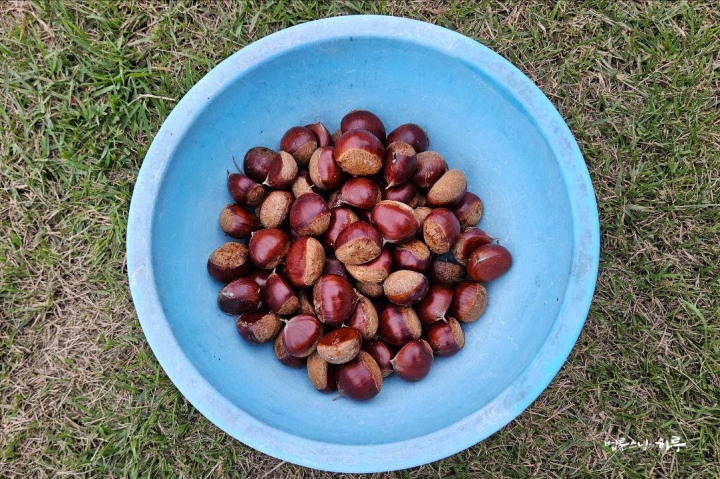
By the time all the chestnuts were gathered, evening was approaching. After dinner, Sunim handled various tasks indoors and went to bed early to recover from the fatigue of the overseas trip.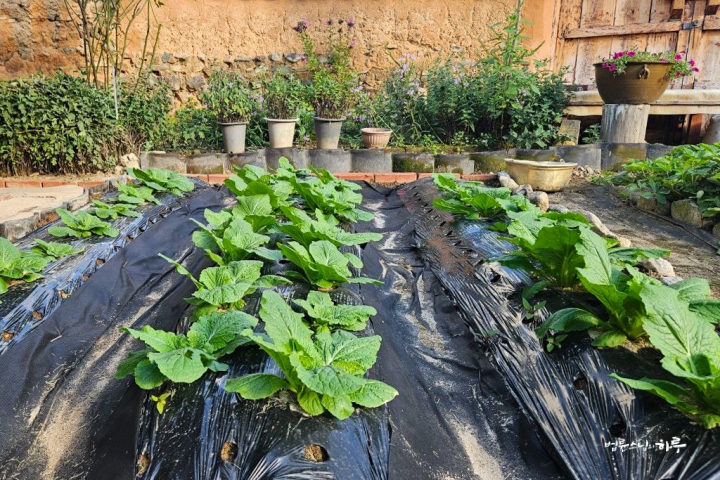
Since there was no Dharma talk today, I’ll conclude by sharing a dialogue between Sunim and a questioner from yesterday’s Dharma Q&A in Bangkok.
Will Human Value Disappear When Artificial Intelligence Surpasses Humans?
“Why do you think the development of artificial intelligence undermines human dignity? What is human dignity? For example, if running fast were human dignity, we should despair when we see horses. In the past, humans worked only with their own strength. Since men were stronger than women and had advantages, a male-dominated society was created. Then humans began to work with the help of other animals like horses and elephants. When the Industrial Revolution occurred, we began using steam engine power and machines. Now we hardly need animals for work, and human strength isn’t important either. Do you need a man’s strength to dig with an excavator? Whether woman or man, child or adult, if you can operate the machine well, the excavator digs on its own. Yet we don’t say machines undermine human dignity.
However, there was a time when people thought that way. In early 19th century England, the ‘Luddite movement’ occurred – a machine-breaking movement where people destroyed machines thinking they were taking away human labor. Like that, there are always side effects in times of sudden change. But since humans keep finding other work to do, there’s no major problem in the big picture. If I were a doctor now, doctors’ work might decrease significantly in the future. A situation might arise where suddenly only 10 doctors are needed instead of 100. If only managers are needed and 90 are unnecessary, those 90 would struggle immediately. However, the growing younger generation won’t do that work from the beginning and will do other things.
When Korea modernized, over 90 percent of our population were farmers at that time. But with industrialization, rural areas collapsed. Farmers had nowhere to go and became urban poor, suffering greatly. Have you heard about the urban poor that emerged between the 1960s and 70s? There were many such people in Cheonggyecheon. But the young generation at that time went to work in factories. Farmers who were once over 90 percent of the population are now less than 10 percent. But that doesn’t mean the world is worse off now. New jobs have emerged, and people are making a living doing other things.
Afterwards, many Koreans lived as self-employed business owners, but now self-employment is disappearing. Just because self-employment disappears doesn’t mean humans can’t live. But it’s a big problem for self-employed people. These days, with the development of artificial intelligence, danger approaches technical jobs, so people in technical fields feel like the world is turning upside down. For self-employed business owners, the world already turned upside down 20 years ago. Go to traditional markets now. You don’t know how much the market districts that once boomed with premium rights on stores have declined. Grandmothers continue their businesses reluctantly because it’s too wasteful to abandon their stores. Even so, there’s no major problem for society as a whole.
In the future, attending university to study a specific major, getting certifications, and finding jobs that perfectly match will increasingly disappear. It’s like how in the past, attending seodang (traditional schools) and passing civil service exams led to becoming government officials, but when the civil service exam system was abolished, attending seodang became useless. Still, there’s really no problem. While there are certainly people who struggle during such transitions, children aren’t affected because they don’t pursue those careers from the beginning as they grow up.
Over 90 percent of the jobs we have today didn’t exist 200 years ago. Most people were engaged in agriculture, with some in handicrafts and commerce. But looking at America now, the agricultural population is only about 3 percent. Yet people all have their own occupations and are living. Some people make a living applying nail polish to hands, others by drawing eyebrows on faces. Even if these jobs disappear, who knows how many other jobs will emerge in the future. These days, some people make a living exercising with others, and some walk other people’s dogs for work. People from the past would find it ridiculous. Things we can’t even imagine now will happen. So you don’t need to worry too much.”
“I had many worries, but they seem somewhat resolved.”
“However, as distribution shifts largely online now, self-employed people are taking a big hit. What kinds of institutional or policy measures should society implement in response? Reviving traditional markets and self-employment isn’t what we should do now. What’s needed is building social safety nets for people who are severely impacted during transitions. For example, there could be ways to support minimum living expenses for people who fall due to changes in occupational categories.
These days, the number of children has drastically decreased compared to before. Accordingly, the number of teachers graduating from education colleges should also decrease. Previously, teachers taught 60 students per class, then it decreased to 50, 40, 30, and 20 students. Since the number of children has decreased, the number of teachers should also be reduced, but if we reduce teachers, we should also reduce the number of education college professors, and furthermore, the number of education colleges. But now we can’t reduce the number of education colleges or teachers. So we’re moving in the direction of continuously reducing the number of students per teacher from 20 to 15 to 10. We need to move toward reduction anyway, but since we can’t change the system immediately, there’s resistance. In this situation, the challenge is ‘how to create social safety nets?’ It’s impossible to maintain the current number of education colleges and teachers.
In the past, graduating from medical school guaranteed becoming a doctor, but that won’t be the case in the future. Also, people thought becoming a teacher after graduating from education college was a decent job, but listening to teachers now, they say it’s degrading into a 3D (difficult, dirty, dangerous) occupation. Like that, preferred occupational groups change with social changes. The problem is that parents foolishly insist on what were good jobs when they were young and force those careers on children who will live 20 years in the future. Of course, it would be nice if things went as parents think, but it becomes problematic if the world changes completely differently than expected 20 years later.
When creating workers needed for industrial society, learning and mastering lots of knowledge and skills at school enabled efficient career acquisition. But now we’ve changed to a society where knowledge is stored in external servers and can be searched and used. Still, the school system remains focused on memory-driven exams and similar practices. What’s studied this way will become useless in the future. If a man in his 50s who accumulated tremendous agricultural know-how has to go weld at a shipyard due to societal changes, the skills learned over 20 years become completely unnecessary. So people in their 20s end up working better than those in their 50s.
As you said, it’s true that people in existing occupational groups fall due to technological development. But I don’t think the world will end or human dignity will be damaged because of it. Of course, there were cases where the dignity of urban poor was greatly damaged during past industrialization. When living farming in the countryside, they could maintain dignity despite poverty, but they lost that dignity becoming urban poor. Such changes will happen in the future too. No one can predict what new jobs will emerge in the future. As you said, the world changes at a rapid pace. 
In this era, the best education is to teach children to become people who can do anything. Teaching children ‘this is right, that is wrong’ is imitative education. In creative education, there is no right or wrong. Things can be this way or that way. So when children bring their homework, teachers should say things like ‘That’s fine too,’ ‘Oh, there’s this method as well,’ ‘That’s also one way to do it.’ They shouldn’t say ‘That’s wrong’ or ‘That’s right.’ Otherwise, the thinking system becomes schematized. Artificial intelligence is better at schematizing than humans. Just as children naturally learn all the languages when family members of different nationalities speak three languages at home, children learn everything anew.
The problem isn’t the children, it’s the adults. Even if the climate is changing now, it’s we adults who are the problem. We have a problem because squid aren’t being caught in the East Sea these days, but for children who grow up in an environment where tuna is caught in the East Sea from birth, the disappearance of squid isn’t a problem at all. The reason we say climate change is a crisis is because humans have adapted best to current climate conditions, and if the climate changes, we won’t be able to do so anymore. In the past, apples grew best in Daegu, but as temperatures gradually rose, apple farming is no longer possible in Daegu. But that doesn’t mean all farming in Daegu has become impossible. It’s just that apple farming isn’t possible. So apple farming moves further north, and other crops can be grown in Daegu. It’s not that all fish can’t live in the East Sea – squid and pollock move north, while tuna and anchovies from the southern seas move up to the East Sea. During this transition, fishermen who only had equipment for catching squid and pollock will have a very difficult time making a living even if they go out to sea every day because they can’t catch anything. However, after another generation passes, they will adapt. That’s why I’m saying not to worry too much. Especially, you don’t need to worry about human dignity. However, it’s true that humans face difficulties due to these changes. It’s as difficult as leaving farming to live in the city.”
“Thank you. I understand well.”





